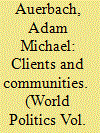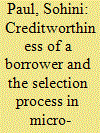| Srl | Item |
| 1 |
ID:
146462


|
|
|
|
|
| Contents |
India’s urban slums exhibit dramatic variation in their levels of infrastructural development and access to public services. Why are some vulnerable communities able to demand and secure development from the state while others fail to? Based on ethnographic fieldwork and original household survey data, the author finds that party networks significantly influence the ability of poor urban communities to organize and demand development. In slums with dense party networks, competition among party workers generates a degree of accountability in local patron-client hierarchies that encourages development. Dense party networks also strengthen organizational capacity and provide settlements with vertical connectivity to politicians and officials. The presence of multiparty networks, however, may attenuate the positive influence of party network density. Interviews with political elites and the survey data suggest that politicians are less likely to provide services to slums with multiparty networks. From within settlements, partisan competition also creates perverse incentives for rival networks to undermine each other’s development efforts. This article contributes to scholarship on clientelism, which has overlooked variation in the density and partisan balance of patron-client networks across poor urban communities and the resulting divergences in democratic responsiveness and development that face those communities. It also contributes to research on distributive politics and the political economy of development.
|
|
|
|
|
|
|
|
|
|
|
|
|
|
|
|
| 2 |
ID:
128309


|
|
|
|
|
| Publication |
2014.
|
| Summary/Abstract |
This article examines whether urban micro-finance institutions (MFIs) consider proxy/hidden collateral in the absence of physical as well as social collateral in judging the creditworthiness of a borrower. MFIs operating in urban slums often adopt an individual lending mechanism since borrowers are not willing to bear joint liability due to the acute problem of migration. Therefore, urban MFIs that offer individual loans are extra-cautious about minimising default risk. This article studies whether MFIs consider ownership of a room in a slum as a hidden selection criterion in a loan programme. Room ownership indicates stability in a particular location, and also indicates the income-generation capability of an aspirant borrower. We use a primary survey database collected from a non-governmental organisation, Navnirman Samaj Vikas Kendra, which provides micro-credit in four slums of north Mumbai in India. We find that the probability of getting selected in a micro-credit programme is significantly higher if a loan applicant owns a room than if the applicant lives in a rented room. MFIs appear to be more concerned about shielding themselves from default than fulfilling the broad goal of maximising social welfare by reaching the poorest of the poor. We present our study with the caveat that the results may not be generalisable, since they are based on a case study.
|
|
|
|
|
|
|
|
|
|
|
|
|
|
|
|